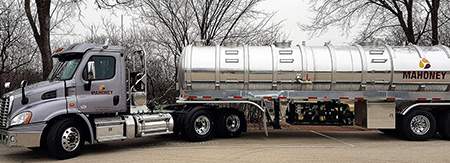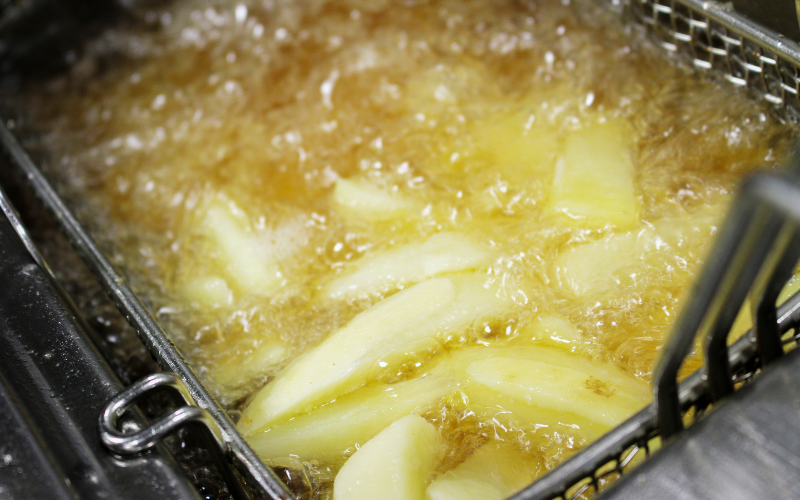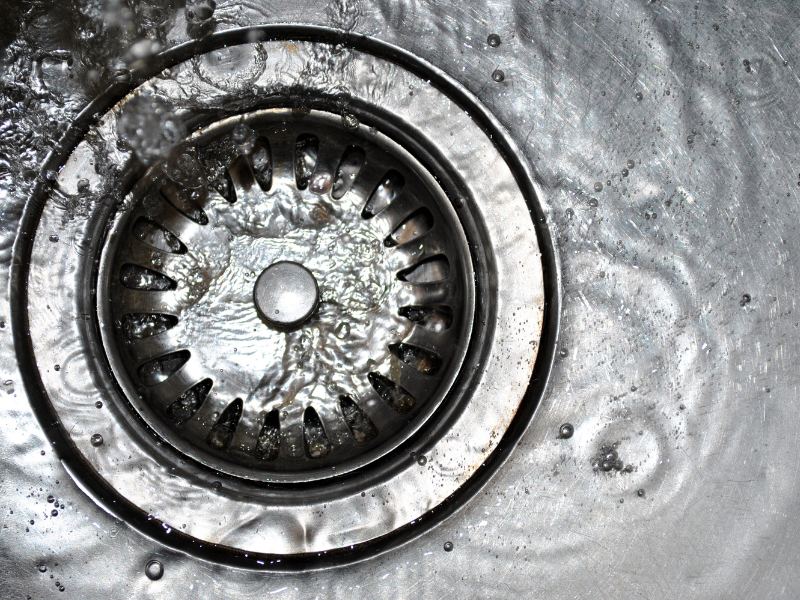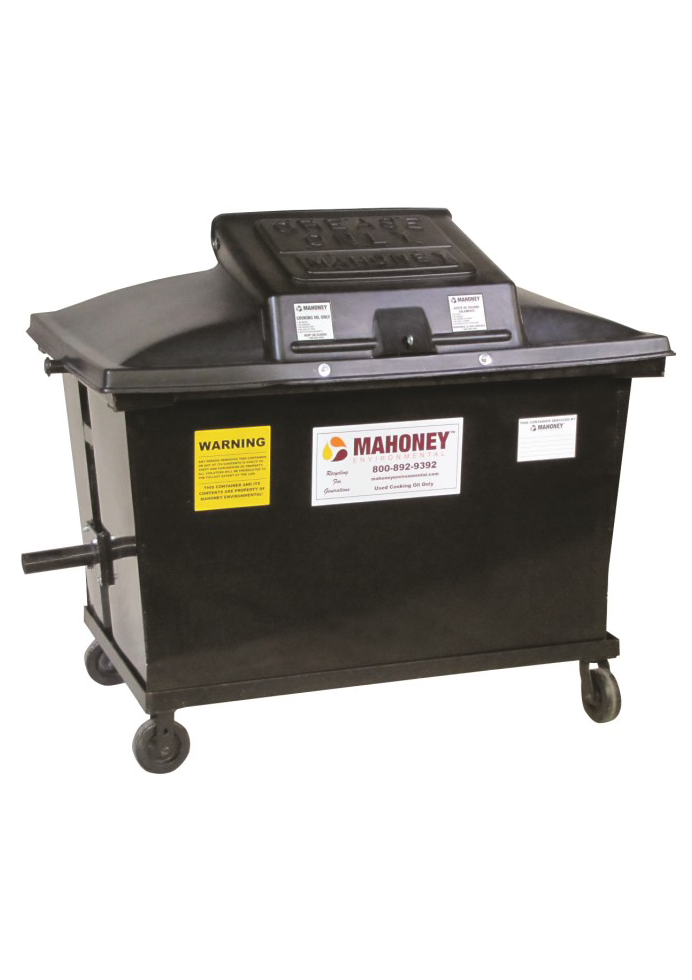There is a lot that goes into running a food service establishment, but it is difficult to run a commercial kitchen without the use of cooking oil. Cooking oil is used in fryers and for other purposes in a commercial kitchen and it is very important for cooking oil to be stored, used, and disposed of properly.
The proper disposal of used cooking oil is especially important because improper disposal is unsafe for your establishment and for the natural environment. Every commercial kitchen needs to have cooking oil equipment installed to manage the use and disposal of cooking oil and prevent used oil from being washed down the drain. If cooking oil is stored or handled improperly, there is a higher risk of an oil spill that will create dangerous conditions in your kitchen. Improper disposal of cooking oil down the drain can not only cause damage within the sewer system and contaminate the natural environment, but also result in fines for your business. Municipalities have codes that must be followed when storing and disposing of used cooking oil and failure to follow these codes can result in expensive fines and even the closing of your restaurant.
After using up cooking oil, it needs to be safely stored and disposed of to protect the natural environment and keep your commercial kitchen safe. In this guide, we will address the most frequently asked questions when it comes to used cooking oil disposal.
1. What is the most environmentally friendly way to dispose of used cooking oil?
When it comes to used cooking oil disposal, the most environmentally friendly option is to ensure that the used oil is recycled. To do this, your establishment must work with a professional that collects used cooking oil and either recycles it themselves or takes it where it can be recycled.
Professionals who provide used cooking oil recycling like Mahoney Environmental will take the oil to a facility where it will be broken down through the process of anaerobic digestion. Through this process, the cooking oil is broken down and it can be converted into biogas which can power cars, heat water, and generate electricity.
Used cooking oil can also be filtered and processed into renewable fuel which burns cleaner than regular diesel fuel. It is also common for used cooking oil to be used in sustainable aviation fuel. It is also common for used cooking oil to be used in animal feed.
Check out our guide 15 Creative Uses of Used Cooking Oil for more about what can be done with used cooking oil.
In order to have your used cooking oil picked up and recycled by a professional, your establishment needs to have a system in place for used cooking oil collection. Cooking oil handling systems, whether they are standard or automated systems, include a storage container for used cooking oil. It is the responsibility of food service establishments to ensure they are collecting the used cooking oil and working with a professional to have their used cooking oil storage containers emptied regularly. At Mahoney Environmental, we work with food service establishments to set up a schedule in which we will come and pick up used cooking oil. All used cooking oil we collect is processed and recycled.
2. How do I dispose of expired cooking oil?
If the cooking oil in your kitchen expires before it is used, do not dump it down the drain. Food service establishments should take every measure they can to prevent cooking oil, whether fresh or used, from going down the drain.
It is possible to throw small amounts of expired cooking oil in the trash as long as it is in a sealable, non-breakable container. Do not dispose of cooking oil in bags or breakable containers because there is a high risk that the oil will leak out and affect the natural environment.
If you have a large amount of expired cooking oil, you can also return it to the professional that supplies you with cooking oil to be recycled. Our professionals at Mahoney Environmental will take back your expired cooking oil and ensure that it is recycled.
3. How do I dispose of a large amount of cooking oil?
Food service establishments often end up with a large amount of used cooking oil. It is very important for your restaurant to have approved containers to store your cooking oil after it is used. While small amounts of cooking oil can be thrown away in the manner discussed above, it is best for large amounts of used cooking oil to be collected and taken to be processed and recycled.
Our professionals at Mahoney Environmental have the capability to pick up and recycle large amounts of used cooking oil from your storage containers.
4. How do I dispose of olive oil?
Olive oil should be treated just like vegetable oil and other cooking oils in that it should never be washed down the drain or thrown directly in the trash. The best way to throw away used olive oil is to put it in a sealable, non-breakable container before putting it in the trash. Homeowners can also compost small amounts of used olive oil.
The best course of action for food service establishments is to put used olive oil in the storage containers with other used cooking oil so it can be collected and recycled.
5. Can I dump used cooking oil in the yard?
You should never dump used cooking oil outside. Even if you dump cooking oil in the grass, it will find its way to the sewer system and cause clogs and other issues. It is also bad for wildlife to dump and leave used cooking oil outside.
6. Can I pour cooking oil down the sink or toilet?
You should never pour used cooking oil down any drain, including sinks and toilets. Oil solidifies in water and will cause a clog in the pipes. If the cooking oil reaches the sewer, it can cause clogs in the municipal sewer lines which result in expensive damage that can cost thousands of dollars to fix.
Food service establishments are required to take every possible action to ensure that cooking oil is not washed down the drain. Commercial kitchens must have grease traps to filter the grease and oil from water that goes down the drain and dishes containing leftover oil should only be washed in sinks that drain into a grease trap.
It is also important for food service establishments to ensure that their grease traps are cleaned and maintained regularly to effectively filter the grease from the water. Mahoney Environmental provides grease trap cleaning and maintenance services to ensure that the traps are regularly cleaned and in good repair.
Used Cooking Oil Collection and Recycling from Mahoney Environmental

The proper handling of cooking oil, including storage, use, and the collection and recycling of used cooking oil, is extremely important for the safety of your establishment and the environment. Commercial kitchens must be fitted with cooking oil handling and storage systems as well as grease traps to prevent the oil from being washed down the drain. Ensuring the proper collection and disposal of used cooking oil will not only protect your establishment and the environment, but also prevent costly fines.
You can help ensure that your used cooking oil is handled and disposed of properly by working with the professionals of Mahoney Environmental. We will work with you to create a schedule of fresh cooking oil deliveries as well as used cooking oil pickups to ensure it is processed and recycled. You can reach Mahoney Environmental for more information by calling (800) 892-9392.



 Call Us Now (800) 892-9392
Call Us Now (800) 892-9392